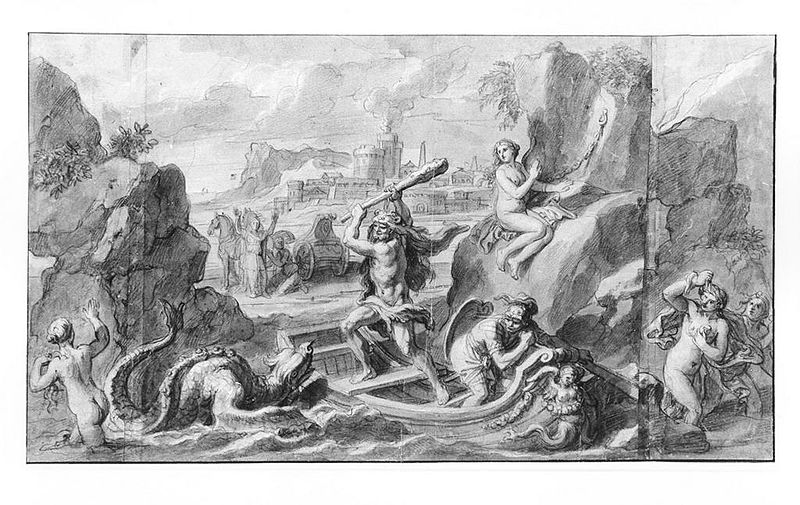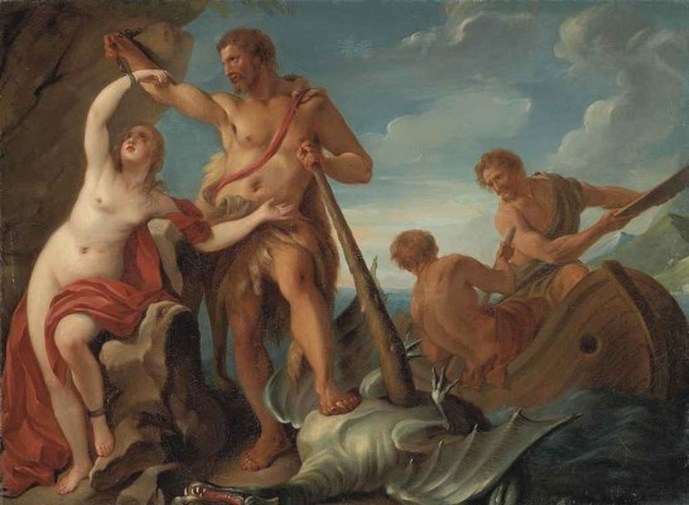THE TROJAN CETUS IN GREEK MYTHOLOGY
The Trojan Cetus was a monster who appears in the texts of Ancient Greece, and as the name suggests was a beast associated with the city of Troy.
Child of Phorycs and Ceto
The name Cetus can be taken to mean whale or large fish, but in Greek mythology, it refers to a sea-monster; and the Trojan Cetus is generally considered to be a monstrous child of the primordial sea deities, Phorcys and Ceto.
This parentage makes the Trojan Cetus sibling to the Aethiopian Cetus, Ladon, Echidna, the Gorgons and the Graeae.
In antiquity, the Trojan Cetus was normally depicted as a sea-serpent, although occasionally it was also depicted as having forelegs.
This parentage makes the Trojan Cetus sibling to the Aethiopian Cetus, Ladon, Echidna, the Gorgons and the Graeae.
In antiquity, the Trojan Cetus was normally depicted as a sea-serpent, although occasionally it was also depicted as having forelegs.
The Cetus of TroyThe Trojan Cetus is associated with the city of Troy, and it was in the time of King Laomedon that the monster came to land of Laomedon.
The gods Poseidon and Apollo had come to troy at a time when they were exiled from Mount Olympus for plotting against Zeus. Not revealing their true identities, Poseidon promised to build defensive walls for the city, whilst Apollo offered to tend the king’s livestock, for payment. Poseidon thus built impenetrable walls, aided by Aeacus, who built sections of wall which were not quite as strong, whilst the livestock tended to by Apollo, flourished, with each animal giving birth to twins, greatly increasing the size of King Laomedon’s livestock holdings. When the gods came for payment, Laomedon refused to pay, and instead expelled the two from his kingdom; Laomedon still being unaware about just who he was expelling without payment. In retribution, Apollo would send a plague and pestilence upon Troy, whilst Poseidon first sent forth a tsunami, before dispatching the Trojan Cetus to ravage the shoreline of Laomedon’s kingdom. |
|
Heracles and the Trojan Cetus
King Laomedon sought guidance from an oracle about how he could rid Troy of the sea-monster, but the proclamation from the oracle was not what he desired to hear, for he would be forced to sacrifice his own daughter, Hesione.
Hesione was thus chained to rocks in preparation for the appearance of the Trojan Cetus.
It was at this time that Heracles, possibly in conjunction with the Argonauts, or else during Heracles' Labours, arrived at Troy, and being quickly appraised of the situation, Heracles went to Laomedon and told the king that he could save his daughter, and kill the Trojan Cetus, if Laomedon would give him the Golden Vine and divine horses that Zeus had given to Tros, as compensation after the abduction of Ganymede.
Laomedon agreed, and so Heracles went down to the shoreline.
The Trojan Cetus might have been a powerful monster, but it was no match for Heracles, and it was commonly said that the Trojan Cetus fell beneath a barrage of arrows unleashed by Heracles, before a death blow was inflicted by the son of Zeus with his mighty club.
A less common method of death for the Trojan Cetus, sees Heracles enter the Trojan Cetus through the monster’s mouth, before opening up the stomach of the monster from the inside with a boat hook.
With the Trojan Cetus slain, and Hesione rescued, Laomedon refused to pay Heracles the promised prizes; a decision which would later prove deadly for Laomedon, for Heracles would return to Troy to gain his revenge.
Hesione was thus chained to rocks in preparation for the appearance of the Trojan Cetus.
It was at this time that Heracles, possibly in conjunction with the Argonauts, or else during Heracles' Labours, arrived at Troy, and being quickly appraised of the situation, Heracles went to Laomedon and told the king that he could save his daughter, and kill the Trojan Cetus, if Laomedon would give him the Golden Vine and divine horses that Zeus had given to Tros, as compensation after the abduction of Ganymede.
Laomedon agreed, and so Heracles went down to the shoreline.
The Trojan Cetus might have been a powerful monster, but it was no match for Heracles, and it was commonly said that the Trojan Cetus fell beneath a barrage of arrows unleashed by Heracles, before a death blow was inflicted by the son of Zeus with his mighty club.
A less common method of death for the Trojan Cetus, sees Heracles enter the Trojan Cetus through the monster’s mouth, before opening up the stomach of the monster from the inside with a boat hook.
With the Trojan Cetus slain, and Hesione rescued, Laomedon refused to pay Heracles the promised prizes; a decision which would later prove deadly for Laomedon, for Heracles would return to Troy to gain his revenge.
|
|
Colin Quartermain - Throjan Cetus - 1st December 2019

